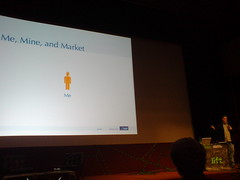LIFT07: Social = Me First, Stowe Boyd
LIFT07: Social = Me First, Stowe Boyd
Member of the Web 2.0 and Media 2.0 workgroup. The title of this talk sounds selfish - a few people complained about it.
With the emergence of Web 2.0 social apps, the old idea of "membership of groups" has faded, to be replaced with the idea of "the individual at the centre of their own world". The most successful social apps are the ones which allow people to pursue what they're interested in foremost, and handle their affiliations with other people after that. Me first: my passions, my people, my markets.
If you build apps to let people do what they want, you abdicate authority. People end up becoming the rule making organisation: "the edge dissolves the centre". Eventually people affiliate based on shared interests - they self-organise. My view of "people who like the music I do" doesn't necessarily map to someone else's - even if they're in my group. Groups are based around individuals.
 Stowe describes himself as a psychiatrist for social software, often called in when it's not working.
Stowe describes himself as a psychiatrist for social software, often called in when it's not working.
If you can't see anything about the person who's logged in, it's a bad sign: there's no "me". Related to me are other people who share my interest. And beyond that the application can provide a platform to provide a marketplace for trading insights, goods, etc. In lots of cases, the market comes first: e.g. searching for music in a predefined way, then a tab with "your friends" is added as an afterthought. This is why there are hundreds of social software companies dying: they get this backwards.
The buddy list is the centre of the universe: "I am made greater by the sum of my connections, and so are my connections". Most of a network is connections.
The fundamental driver for people online is discovery: they want to discover more about the world. Things (e.g. music) are a side-effect. What they want are places where they can learn about things like music.
Not sure I agree with this: wasn't Napster and all the file-sharing software the ultimate expression of discovery? Didn't that completely eschew any form of communication or community?